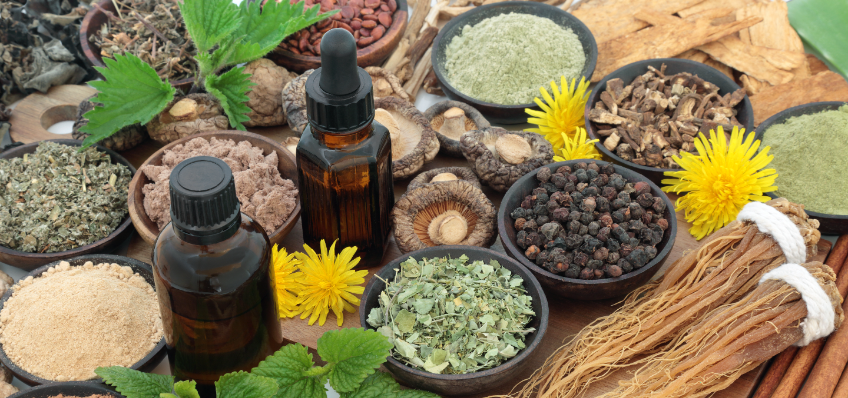
Our bodies are home to a variety of complex systems, functions, and responses. Yet, as modern life becomes more demanding, some are turning to adaptogens to help manage the daily pressures and stress. These herbs, spices, roots, berries, and mushrooms, are marketed as dietary supplements that can have a big impact on our day-to-day stress management. But, what does the science behind them say? Explore what adaptogens are, their potential benefits, and some of the more common varieties available.
Historical Use of Adaptogens
The term ‘adaptogen’ can be traced back to Nikolai Lazarev, a Russian toxicologist. It was used to describe ingredients that support the adrenal system and enhance the body’s response to stress. However, the herbs, spices, roots, berries, and mushrooms that fall under this term are nothing new, as many of them have been used in Eastern medicine for centuries. Still, with the average person’s stress level reaching a record high¹ in 2020, many food producers are catering to market demands and amping up the production of supplements that can help manage stress, leading to a recent boom in sales.
Potential Health Benefits
Generally speaking, adaptogens have been shown to help the body regulate² various systems. From balancing hormones to boosting the immune system, they can provide support to different areas of the body and some have even been recommended for post-surgery recovery treatments. A recent review of studies³ found that adaptogens showed promise in managing fatigue and arthritis, as well as improving sleep. Furthermore, they also showed anti-tumor effects and promise in helping to stabilize the internal environment of the human body.
Common Adaptogens
Of course, certain adaptogens may be better suited to specific issues than others. Furthermore, it’s important to follow dosing recommendations alongside alternating adaptogens every six weeks. Here are some of the most common adaptogens:
Ginseng
While it can also be referred to as Panax quinquefolius, ginseng is recognized as being able to increase energy levels and reduce tiredness. As an adaptogen, it also offers antioxidant and anti-inflammatory, as well as boosts memory and reaction times. Not to mention, it helps strengthen the immune system⁴.
Reishi
As one of the more famous mushrooms in the world, reishi has a long history⁵ of use in Traditional Chinese Medicine. This mushroom is known for its antibacterial and antiviral properties. Also, reishi is an immune modulator, which means it can help the body fight infection and diseases.
Chaga
Used for centuries as medicine in Siberia, Chaga is a fungus that mainly grows on birch trees. Because of how it grows, this mushroom has a unique appearance. Alongside its ability to reduce anxiety and stress, it also helps protect the immune system⁶, thus increasing overall health. Also, it can help fight free radicals, inflammation, and infection.
Turkey Tail
Though its name might make you think of the bird, this is another adaptogen, specifically a mushroom with medicinal properties. What sets this type of fungus apart from the rest is that it contains both polysaccharide peptide and polysaccharide krestin, which has been shown to have anticancer properties⁷. Moreover, this mushroom helps fight colds, as well as ward off and heal infections.
Cordyceps
Cordyceps have been used for over a thousand years to help increase longevity. Nowadays, cordyceps are renowned for helping boost energy levels and minimize fatigue. Additionally, they help protect the immune system while increasing oxygen and ATP levels. This makes this mushroom particularly helpful for managing respiratory illnesses⁸.
Goji Berry
This berry is well known for its beneficial health effects, but studies show that it can also work as an adaptogen⁹ to help the body deal with stress, anxiety, and depression. Goji berries are full of vitamins and plenty of antioxidants, which makes them ideal for supporting the immune system. Also, these berries can help combat inflammation, thereby fighting oxidative damage and illnesses.
Licorice Root
Licorice is a traditional flavor in candies and sweets, although the root itself boasts many health properties. Licorice root can help minimize stress by decreasing cortisol levels, soothing gastrointestinal issues, and boosting the immune system. In addition, this root has anti-inflammatory, antibacterial, and antiviral properties, making it ideal for treating respiratory illnesses.
Adaptogens are proving to be a helpful way to manage stress through nutrition. Learn more about them and explore how to cook with other mushrooms, roots, and spices on Eat Dat!
References
- “Stress in America: A National Mental Health Crisis.” American Psychological Association, American Psychological Association, https://www.apa.org/news/press/releases/stress/2020/report-october.
- “What Are Adaptogens and the Possible Benefits of Taking Them?” What Are Adaptogens and the Possible Benefits of Taking Them? | Jonathan and Karin Fielding School of Public Health, 16 Feb. 2022, https://ph.ucla.edu/news/news-item/2022/mar/what-are-adaptogens-and-possible-benefits-taking-them.
- Liao, Lian-Ying, et al. “A Preliminary Review of Studies on Adaptogens: Comparison of Their Bioactivity in TCM with That of Ginseng-like Herbs Used Worldwide.” Chinese Medicine, BioMed Central, 16 Nov. 2018, https://www.ncbi.nlm.nih.gov/pmc/articles/PMC6240259/.
- Such, Sung-Ock, et al. Prospective Study for Korean Red Ginseng Extract as an Immune Modulator … Journal of Ginseng Research, https://www.researchgate.net/publication/315689738_Prospective_Study_for_Korean_Red_Ginseng_Extract_as_an_Immune_Modulator_Following_a_Curative_Gastric_Resection_in_Patients_with_Advanced_Gastric_Cancer.
- Ganoderma Lucidum (Lingzhi or Reishi) – Herbal Medicine – NCBI Bookshelf. https://www.ncbi.nlm.nih.gov/books/NBK92757/.
- Villines, Zawn. “Chaga Mushrooms: Benefits, Tips, and Risk.” Medical News Today, MediLexicon International, https://www.medicalnewstoday.com/articles/318527#Nine-potential-benefits.
- “Medicinal Mushrooms (PDQ®)–Health Professional Version.” National Cancer Institute, https://www.cancer.gov/about-cancer/treatment/cam/hp/mushrooms-pdq#_8_toc.
- Yang, Lei, et al. “Cordyceps Sinensis Inhibits Airway Remodeling in Rats with Chronic Obstructive Pulmonary Disease.” Experimental and Therapeutic Medicine, D.A. Spandidos, Mar. 2018, https://www.ncbi.nlm.nih.gov/pmc/articles/PMC5795554/.
- DM;, Amagase H;Nance. “A Randomized, Double-Blind, Placebo-Controlled, Clinical Study of the General Effects of a Standardized Lycium Barbarum (GOJI) Juice, GoChi.” Journal of Alternative and Complementary Medicine (New York, N.Y.), U.S. National Library of Medicine, https://pubmed.ncbi.nlm.nih.gov/18447631/.
Ashuni Pérez is a writer in the culinary, as well as health and wellness industries. With a background in teaching and digital media, she loves to learn and help others discover more about their food, where it comes from, and how best to prepare it. A foodie through and through, she is always searching for new recipes and the freshest ingredients.











Leave A Comment